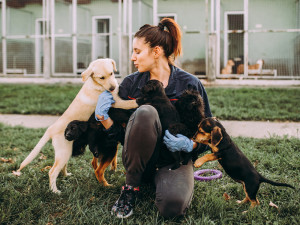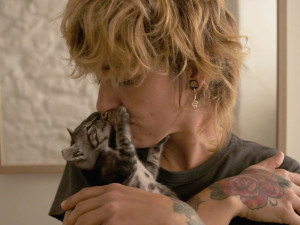Should You Do a Trial Run Before You Adopt a Pet?
Some animal rescues allow trial runs for interested adopters. Get the scoop on how foster-to-adopt programs work.

Share Article
After an extensive meet-and-greet complete with sloppy puppy kisses or adorable kitten head butts, a game of tug-of-war or laser-pointer,opens in new tab and plenty of cuddles, you’re in love. But you also have some questions: Will this perfect dog sleep through the night? Will he howl at the neighbors? Will this angelic cat get along with — or at least tolerate — the resident dog? Will she be able to resist knocking over your potted plants?
Adopting a pet is a long-term commitment, and you want to be sure you get it right. That’s why shelters and rescue groups often allow trial adoptions (also called foster-to-adopt programs) so interested adopters can determine if a pet is the right fit for their homes and lifestyles. We talked to Maddie Swab, a dog foster manager for Austin Pets Alive!opens in new tab, to find out everything there is to know about foster-to-adopt programs and how you can get started with a trial adoption.
How do foster-to-adopt programs work?
Ask your local shelter whether there is an established program. Keep in mind that even when a shelter offers trial adoptions, not all animals are eligible. Most foster-to-adopt programs will require you to complete an adoption application, which can include information about your living situation, current pets, and vet references. After the shelter reviews and approves your application, you’ll be eligible to take a pet home on a trial basis. Some shelters charge adoption fees up front that can be refunded if the animal is returned within the trial period.
How long do trial adoptions last?
Depending on the shelter, the timeframe to make a decision may range from a week to a few months. Some shelters even offer weekend sleepovers. Austin Pets Alive! limits trial adoptions to one week for puppies but allows up to three weeks to allow prospective adopters to decide whether to adopt a dog with medical challenges. “Often, dogs who have medical or behavioral challenges benefit from their potential adopter getting the chance to see if the challenge is something they can work with in their home,” Swab says.
How should I prepare for a trial adoption?
Before you bring a dog or cat into your home for a trial adoption, be sure you have all the supplies your new houseguest needs to feel safe and welcomed, including food, a litter box and litter,opens in new tab bowls, and a leash, collar, or harness.
You probably also want to have a comfy bed and a few toys on hand to help them settle in. If you will be fostering-to-adopt a puppy or dog who is not potty-trained, you should consider a crate or puppy pen. Swab also encourages potential adopters with existing pets to schedule a meet-and-greet at the shelter to introduce pets where shelter staff can monitor interactions and offer pointers on welcoming a new pet, even temporarily.
What should I be looking for during the trial adoption?
This process should let you know whether you want to bring the dog or cat into your home on a full-time basis.
Does the dog enjoy being in the center of the action when the kids are torpedo-ing around the house, or do they hide away from the activity and noise? Are your morning and evening walk s enough to burn off their energy or do you need to hire a dog walker, or send them to doggie daycare to satisfy their exercise and socialization needs? Is the cat obsessed with cuddles, or do they hiss when you try to show them affection?
What do I need to remember?
A pet’s behavior on the first day — or even in the first week — may not be an accurate representation of their true personality; it takes time for dogs and cats to adjust to a new environment. Swab advises giving pets time to decompress and letting them settle in at their own pace.
Shelter staff are there to act as a resource, so don’t be afraid to ask questions during the trial adoption, especially if you need more time to make a decision. “We will sometimes consider extending the foster-to-adopt period as needed to give that dog and the potential adopter the best chance to get to know each other and see if they’re a good fit for each other,” Swab adds.
What if it’s not a fit?
Not all trial adoptions are success stories. If you discover that the dog or cat who has been bunking with you for several days isn’t the right fit for your family, don’t worry. It was still worthwhile for you, the pet, and the shelter. Spending time in a home environment helps animals decompress, which is a bonus, even when it doesn’t lead to an adoption. Trial adoptions also give adoption coordinators more information about pets — including insights into their behavior in a home environment — that can be beneficial when it comes to finding them the right forever family.
If your trial adoption goes well, encourage others to participate in similar programs. “Fosters, who provide temporary homes for puppies, dogs, kittens or cats, give shelter pets an opportunity to live in a home, instead of a kennel at a shelter,” she explains. “Some might call their foster-to-adopt pets ‘foster fails,’ but we think of them as ‘foster wins,’ as another dog or cat has found a loving home.”

Jodi Helmer
Jodi Helmer is a North Carolina-based freelance writer who shares her home with an embarrassing number of rescue dogs and relies on four feral cats to patrol the barn. When she isn’t refilling food and water dishes, Jodi writes about animals for Scientific American, Sierra, WebMD, AKC Family Dog, Living the Country Life, and Out Here.
Related articles
![Woman holding dogs at an animal shelter]()
10 Ways Animal Shelters Are Upping Their Game
New trends we can totally get behind.
![Blonde woman with hand tattoo kissing her gray kitten]()
A Step-by-Step Guide to Adopting a Cat
From where to begin looking to what the adoption process entails to how to prepare your home for your new pet.
![A dog at a shelter looking up at the camera.]()
10 Questions to Ask a Shelter About an Adoptable Dog
From exercise needs to medical history to compatibility with kids, here is everything you need to know.
![A woman staring at her computer while holding her dog close.]()
10 Things to Consider Before Adopting a Pet
It’s a big decision, so check these boxes before you sign on the dotted line.






